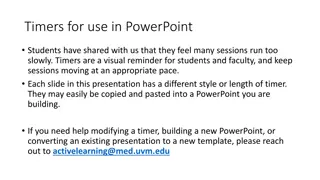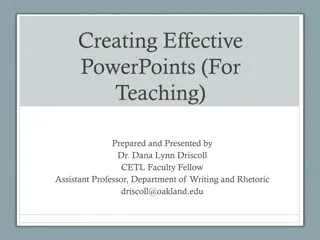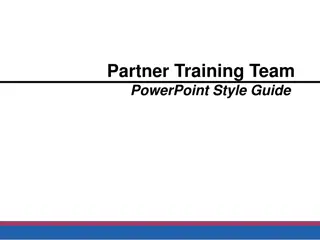PowerPoint can be found
This presentation by Dr. Dawn-Elise Snipes covers holistic approaches in treating co-occurring disorders through transdiagnostic interventions. It explores the connection between addiction, mood disorders, and physical health issues, offering insights on addressing underlying causes like stress, nutritional imbalances, and sleep dysregulation. The session delves into diagnostic theories, symptom overlaps, and practical solutions for comprehensive care.
Download Presentation

Please find below an Image/Link to download the presentation.
The content on the website is provided AS IS for your information and personal use only. It may not be sold, licensed, or shared on other websites without obtaining consent from the author.If you encounter any issues during the download, it is possible that the publisher has removed the file from their server.
You are allowed to download the files provided on this website for personal or commercial use, subject to the condition that they are used lawfully. All files are the property of their respective owners.
The content on the website is provided AS IS for your information and personal use only. It may not be sold, licensed, or shared on other websites without obtaining consent from the author.
E N D
Presentation Transcript
PowerPoint can be found at https://allceus.com/IBH Dr. Dawn-Elise Snipes Executive Director AllCEUs.com and Host: Counselor Toolbox Podcast
Transdiagnostic (Holistic) Approaches to the Treatment of Co-Occurring Disorders Presented by: Dr. Dawn-Elise Snipes Executive Director, AllCEUs.com Counselor Education Dr. Dawn-Elise Snipes Executive Director AllCEUs.com and Host: Counselor Toolbox Podcast
Objectives Define the transdiagnostic and transactional theories Explain the connection between addiction and mood disorders and Stress Nutritional Imbalances Sleep and circadian rhythm dysregulation Identify transdiagnostic interventions that will aid in addressing mood and addictive disorders and physical health issues Dr. Dawn-Elise Snipes Executive Director AllCEUs.com and Host: Counselor Toolbox Podcast
Problem: Not Enough Water Cause: Leak or blockage in the system Fix: Turn up the water pressure Find the leak and repair it Dr. Dawn-Elise Snipes Executive Director AllCEUs.com and Host: Counselor Toolbox Podcast
Transdiagnostic & Transactional Approaches Transdiagnostic Model (Finding the leak) Asserts that many symptoms are common to many disorders such as Changes in sleeping patterns Changes in eating patterns Irritability Fatigue We need to address what is causing the symptom If you have a 48 year old female client who presents with 6 weeks of clean time (>10 years use), apathy, anhedonia, fatigue, hypersomnia, lack of appetite but clinically obese, what might be the diagnosis? PAWS, depression, sex hormone imbalances, thyroid hormone imbalances, apnea, HPA-Axis dysfunction, nutritional deficits, sleep and circadian rhythm dysfunction Dr. Dawn-Elise Snipes Executive Director AllCEUs.com and Host: Counselor Toolbox Podcast
Transdiagnostic & Transactional Approaches Transactional Model Asserts that there is a reciprocal interaction between everything. Transactions can be positive or negative Nutrition Sleep Psychopharmacology Mindfulness Dr. Dawn-Elise Snipes Executive Director AllCEUs.com and Host: Counselor Toolbox Podcast
Common Co-Occurring Issues Chronic Stress Mood Disorders Autoimmune Issues Chronic Pain ADHD Post Acute Withdrawal Syndrome How do each of these impact people s ability to achieve full and sustained recovery? Dr. Dawn-Elise Snipes Executive Director AllCEUs.com and Host: Counselor Toolbox Podcast
HPA Axis Threat Response System Excess stress depletes natural dopamine stores and creates a ripple effect on endorphins (pain and pleasure) Hypothalamic-Pituitary-Adrenal (HPA) axis dysregulation in response to chronic stress Low serotonin leads to less inhibition of aggression, anhedonia High serotonin leads to decreased appetite, less need for sleep, increased agitation (Anger/agitation/anxiety) Adrenaline and noradrenaline turn on, leading to increased hyperfocus and attention Combined these increase cardiac output ( Anxiety ) Dopamine sustains the needed energy level and prompts an increase in endogenous opioids which subdue the pain being experienced Dr. Dawn-Elise Snipes Executive Director AllCEUs.com and Host: Counselor Toolbox Podcast
HPA Axis Continued stress Hypocortisolism Dopamine decreases: Fatigue & anhedonia, impulsivity/self-harm Higher levels of endogenous opioids (but less effective): Numbing, blunting, depersonalization, risk of addictive behaviors Symptoms of dysregulation and depression Dr. Dawn-Elise Snipes Executive Director AllCEUs.com and Host: Counselor Toolbox Podcast
Transdiagnostic Issues Stress causes people to use a lot of dopamine Dopamine dysregulation is thought to play a role in Mood Disorders Addiction ADHD Chronic Pain Autoimmune Issues Dr. Dawn-Elise Snipes Executive Director AllCEUs.com and Host: Counselor Toolbox Podcast
Transdiagnostic Issues Cortisol (Stress hormone) Is necessary for motivation but in excess Increases estrogen and reduces testosterone (reduced libido) Dysregulates serotonin and dopamine (and melatonin, ghrelin, leptin) Sleep Mood Appetite Pain Tolerance Causes chronic inflammation which is strongly correlated with pain and depression Dr. Dawn-Elise Snipes Executive Director AllCEUs.com and Host: Counselor Toolbox Podcast
Trauma, Stress and the HPA-Axis Trauma and even chronic or acute stress causes HPA-Axis dysregulation and can lead to hypercortisolism (Depressive symptoms and dysregulation) Dr. Dawn-Elise Snipes Executive Director AllCEUs.com and Host: Counselor Toolbox Podcast
Marinara Oregano Bitter, spicy Basil--Sweet Garlic Balances basil Marjoram Sweet, minty Parsley Flavor enhancer Salt Balances sugar Sugar Eliminates bitter Dr. Dawn-Elise Snipes Executive Director AllCEUs.com and Host: Counselor Toolbox Podcast
Addictions Numb stress Self medicate mood issues related to stress, systemic dysfunction or ADHD Self medicate pain issues (exacerbated by stress) Stress and Co-Occurring Issues Anxiety & Depression Systemic disruption due to addictions including PAWS HPA Axis dysregulation due to stress Lifestyle factors adding stress to the body Dr. Dawn-Elise Snipes Executive Director AllCEUs.com and Host: Counselor Toolbox Podcast
Stress Reduction: What Causes Stress? What we usually address Cognitive Problem Solving Dialectics/Living in the And Learned Optimism Inner Critic Interpersonal Communication Boundaries and Healthy Relationships Attachment Dr. Dawn-Elise Snipes Executive Director AllCEUs.com and Host: Counselor Toolbox Podcast
Stress Reduction What we usually address Environmental Noise Light Smell Ergonomics Safety (Emotional and Physical) Dr. Dawn-Elise Snipes Executive Director AllCEUs.com and Host: Counselor Toolbox Podcast
What else??? Helping the body machine get what it needs to function more efficiently can assist in addressing a myriad of factors contributing to addiction, mood disorders, chronic pain and more Dr. Dawn-Elise Snipes Executive Director AllCEUs.com and Host: Counselor Toolbox Podcast
Sleep (HALT) Effects of sleep deprivation Irritability Impulsivity Difficulty concentrating Depression and anxiety Addiction Sleep deprivation is a potential detrimental factor to the extinction process of drug cues. Sleep interventions can bidirectionally regulate cocaine craving and seeking after withdrawal Sleep deprivation is a significant risk factor for relapse Eating disturbances Reduction in dopamine and increase in serotonin Improve sleep hygiene Dr. Dawn-Elise Snipes Executive Director AllCEUs.com and Host: Counselor Toolbox Podcast
Bright Light Bright light increases serotonin and helps reset circadian rhythms Can be helpful in the treatment of Depression Addiction Bright light therapy Dr. Dawn-Elise Snipes Executive Director AllCEUs.com and Host: Counselor Toolbox Podcast
Nutrition (HALT) Nutrition support therapy has been identified as a potential target for addressing Addiction Mood disorders: Twelve Antidepressant Nutrients relate to the prevention and treatment of depressive disorders: Folate, iron, long-chain omega-3 fatty acids (EPA and DHA), magnesium, potassium, selenium, thiamine, vitamin A, vitamin B6, vitamin B12, vitamin C, and zinc The gut microbiome plays a facilitating role between stress response, inflammation, and depression, and anxiety. Addressing gut health will facilitate improvement in mood, sleep and pain. Dr. Dawn-Elise Snipes Executive Director AllCEUs.com and Host: Counselor Toolbox Podcast
Exercise Moderate intensity exercise for ~30 minutes can be effective in the treatment of addiction During drug use initiation and withdrawal, effectiveness is related to its ability to increase dopamine. Once addiction develops, it normalizes glutamate and dopamine signaling and reverses drug- induced changes in the reward pathway Is effective in addressing mood-disorders partly by increasing serotonin, dopamine and GABA The type of exercise, intensity and timing depends on the client s physical condition and co- occurring issues Dr. Dawn-Elise Snipes Executive Director AllCEUs.com and Host: Counselor Toolbox Podcast
Mindfulness People who practice mindfulness will become less reactive to unpleasant internal phenomena and more reflective, leading to positive mental health and behavioral outcomes Mindfulness is associated with more problem focused coping and less emotion focused coping. Dr. Dawn-Elise Snipes Executive Director AllCEUs.com and Host: Counselor Toolbox Podcast
Meditation In some groups, mindfulness meditation is more effective than physical exercise at attenuating depression. Meditation takes many forms from mindfulness based meditation to walking meditation. Dr. Dawn-Elise Snipes Executive Director AllCEUs.com and Host: Counselor Toolbox Podcast
Massage Studies highlight the stress-alleviating effects (decreased cortisol) and the activating effects (increased serotonin and dopamine) of massage therapy on a variety of medical conditions and stressful experiences. How can this benefit our clients? Dr. Dawn-Elise Snipes Executive Director AllCEUs.com and Host: Counselor Toolbox Podcast
Aromatherapy Essential oils trigger mechanisms in the brain via the olfactory system. After inhalation, the signal is transmitted to the limbic system and hypothalamus which results in the release of neurotransmitters resulting in the expected effect on emotions Diffusing essential oils can assist clients. Dr. Dawn-Elise Snipes Executive Director AllCEUs.com and Host: Counselor Toolbox Podcast
Aromatherapy Depression Bergamot, Lavender, Chamomile, Ylan Ylang, Rosemary Anxiety Bergamot, Catnip, Chamomile, Clary sage, Lavender, Lemon, Neroli, Rose, Valerian, Ylang-ylang. Cravings Black pepper, Angelica, Lavender, Rosewood, Bergamot Focus/ADHD Roman chamomile, Lavender, Mandarin, Ylang Ylang, Vetiver Pain Lavender, Peppermint, Sandalwood, Eucalyptus (and anxiety aromas) Dr. Dawn-Elise Snipes Executive Director AllCEUs.com and Host: Counselor Toolbox Podcast
Summary Co-occurring addiction, mood and health related issues all impact one another When the body is malnourished, lacking sleep, in pain or under stress it impacts mood and potentially relief seeking behaviors (HALT) When a person is experiencing mood issues they often have alterations in neurotransmitters, eating habits and sleep which can dysregulate their circadian rhythms. These can also lead to relief seeking behaviors When a person is using an addictive substance or behavior it alters dopamine and endogenous opioid levels which impacts mood, sleep, eating and relief seeking behaviors Psychopharmacology only works for 40-60% of people. Why? Because it doesn t address other underlying issues which may be contributing to or causing the mood symptoms or relief seeking behaviors. Dr. Dawn-Elise Snipes Executive Director AllCEUs.com and Host: Counselor Toolbox Podcast
Dr. Dawn-Elise Snipes 1633 W. Main St. #902 Lebanon, TN 37087 Dr.Snipes@allceus.com Dr. Dawn-Elise Snipes Executive Director AllCEUs.com and Host: Counselor Toolbox Podcast























